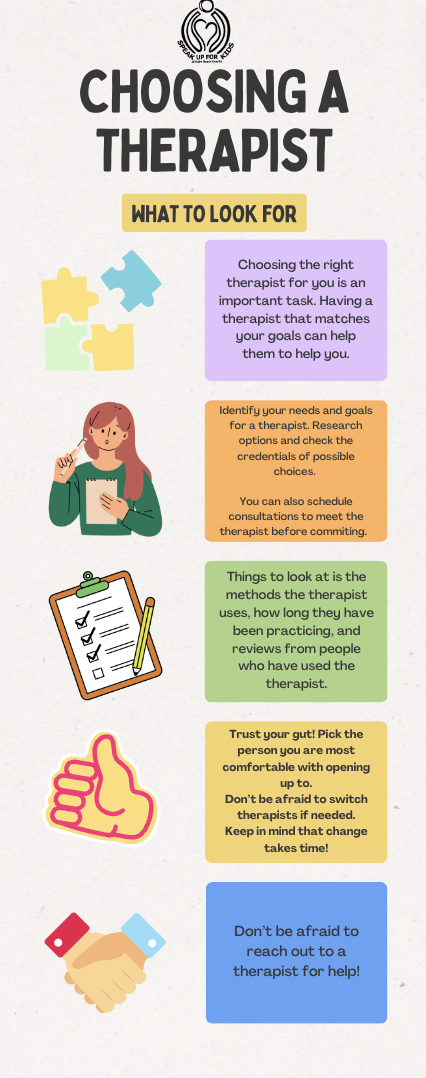Choosing a Therapist
Contributed by Speak Up for Kids Student Intern Team — This article was developed through the combined efforts of multiple student interns, each bringing unique skills and perspectives to support life skills education for foster youth.
Overview
Finding the right therapist is a crucial step in your mental health journey. The right therapist can provide you with the support, tools, and understanding needed to navigate life's challenges. Here’s a guide on how to choose a therapist and what to consider during the process.
Steps:
Identify Your Needs:
Specific Issues: Determine what specific issues you want to address, such as anxiety, depression, trauma, or relationship problems.
Therapy Type: Decide if you prefer individual therapy, couples therapy, family therapy, or group therapy.
Research Potential Therapists:
Referrals: Ask for recommendations from friends, family, or healthcare providers.
Online Directories: Use online directories like Psychology Today, TherapyDen, or your insurance provider's website to find licensed therapists in your area.
Professional Associations: Look for therapists through professional associations like the American Psychological Association (APA) or the National Association of Social Workers (NASW).
Consider Credentials and Experience:
Licensing: Ensure the therapist is licensed to practice in your state. Common credentials include LPC (Licensed Professional Counselor), LCSW (Licensed Clinical Social Worker), LMFT (Licensed Marriage and Family Therapist), and PsyD/PhD (Doctor of Psychology).
Specializations: Look for therapists who specialize in the issues you want to address. Experience with specific populations (e.g., adolescents, LGBTQ+ individuals) may also be important.
Evaluate Their Approach:
Therapeutic Techniques: Different therapists use different approaches, such as Cognitive Behavioral Therapy (CBT), Psychodynamic Therapy, or Humanistic Therapy. Research these methods to see which aligns with your needs.
Personal Fit: Consider whether the therapist’s approach and personality feel like a good fit for you.
Check Practical Considerations:
Location: Choose a therapist whose office is conveniently located or who offers online sessions.
Availability: Ensure the therapist’s availability matches your schedule.
Cost and Insurance: Confirm the therapist’s fees and whether they accept your insurance or offer sliding scale fees.
Schedule an Initial Consultation:
Interview Potential Therapists: Many therapists offer a free initial consultation. Use this time to ask questions and get a feel for whether you’d be comfortable working with them.
Assess Comfort and Rapport: Pay attention to how you feel during the consultation. A good therapeutic relationship is built on trust and comfort.
Key Questions:
What Are My Therapy Goals?
What specific issues or goals do I want to address in therapy?
What outcomes am I hoping to achieve?
What Credentials and Experience Should the Therapist Have?
What qualifications are important for addressing my specific issues?
Does the therapist have experience with similar clients?
What Therapeutic Approach Suits Me Best?
What therapy methods or approaches do I think would be most effective for me?
How do I prefer to work through my issues (e.g., structured approach vs. open-ended)?
How Practical Are the Therapist’s Logistics?
Is the therapist’s office location convenient, or do they offer online sessions?
Does the therapist’s schedule align with mine, and are their fees within my budget?
How Do I Feel About the Therapist?
Do I feel comfortable and understood by the therapist?
Do I believe I can build a trusting relationship with them?
What Are Their Policies on Confidentiality and Emergency Contact?
How does the therapist handle confidentiality?
What are the procedures for contacting the therapist in case of an emergency?
Tips:
Be Patient: Finding the right therapist can take time. It’s okay to meet with a few different therapists before making a decision.
Trust Your Instincts: Your comfort and trust in the therapist are crucial. If something doesn’t feel right, it’s okay to look for someone else.
Be Open: Be honest about your needs and concerns during the consultation to ensure the therapist can meet your expectations.
Stay Committed: Once you find a therapist, commit to the process and attend sessions regularly to get the most out of therapy.
Final Thoughts
By following these steps and considering these questions, you can find a therapist who is well-suited to help you on your mental health journey. Choosing the right therapist is a personal and important decision, and taking the time to find the right match can lead to significant improvements in your well-being.


